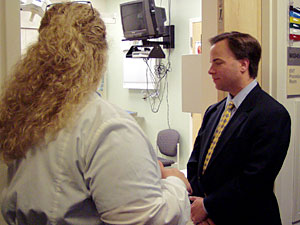|
Audio
Photos
Your Voice
|
Administration officials stump for prescription drug package
August 14, 2003
 |
| National Institutes of Health Director Elias Zerhouni tours Regions Hospital (MPR Photo/Tom Scheck) |
St. Paul, Minn. — The four leading health professionals in the Bush administration are touring the nation at a time when reports out of Washington say House and Senate conferees are gridlocked on their dramatically different plans.
U.S. Surgeon General Richard Carmona told an audience of seniors, health professionals and reporters at Regions Hospital in St. Paul that the time has come to pass a bill that would provide prescription drugs to seniors on Medicare.
 | |||
"Not passing a bill must not be an option this year. We must finish the job. Seniors are tired of wating and as doctors we don't think they should wait any longer for access to the modern medicine of the 21st century," he said.
The two plans are expected to cost, at a minimum, $400 billion over the next 10 years. Both bills include high co-payments -- sometimes as high as half the cost of drugs --and have substantial gaps in coverage. For example, under the Senate plan, seniors would pay a 50-percent co-payment until their drug costs hit $4,500 a year. Seniors then have to pay the entire cost of their drugs until their total bill reaches $5,800. Medicare will pick up 90-percent of the costs above that.
Elias Zerhouni, the director of the National Institutes of Health, says science medicine has improved dramatically in the past 30 years and Medicare coverage has not kept up.
"In Medicare today, you will get reimbursed to get very complex cardiac surgery -- very complex angioplasty techniques -- but you would not be reimbursed for getting that pill that would prevent you from having surgery in the first place," he said.
Several seniors in the audience were critical of the complexity and coverage gaps in both plans. Marty Gates, chair of the Medicare Justice Coaltion, a group that advocates for equal Medicare reimbursement nationwide, says she's concerned that both bills allow private insurance companies and Preferred Provider Organizations to negotiate lower costs for seniors. She says she'd prefer that the government put price controls on the drug companies.
 | |||
"How does this prescription drug bill do anything to help control the rising cost of drugs? I see no reference to any kind of negotiation nor even making it available for the senior Medicare population to take advantage of the already negotiated price of the VA (Veteran's Administration) and the prison systems," she said.
FDA Commissioner Mark McClellan said seniors would see a discount on drugs because the private insurance companies would be able to pool millions of Medicare recipients together to negotiate drug discounts. McClellan would not say if the FDA would allow a provision that allows seniors to buy imported drugs from Canada.
Drugs cost less in Canada because the government negotiates prices with drug companies. McClellan said that allowing broad imports would restrict the FDA's ability to inspect and test imported drugs.
"That seems to me like the wrong direction to go, in an era when counterfitting is getting more sophisticated. When there are a lot of people on the internet who are out to make a fast buck at the expense of seniors and it's a time when you need a strong FDA more than ever," McClellan said.
Other critics say the Bush administration is focusing too much on cutting taxes to provide a drug bill with appropriate coverage. Sen. Mark Dayton, DFL-Minn., says he voted for the bill because it was better than nothing. But he says the bill has serious flaws.
"We only have half of the money in there that should be in the federal program," he said. "No matter how you slice it or dice it it will be very hard to provide a quality program. And the Senate bill doesn't even take effect until January 2006. What a cruel hoax for seniors who already been waiting so long for prescription drug coverage!"
States are also watching the debate very carefully. An official with the Minnesota Department of Human Services says she's worried that the federal government will exempt lower income people who qualify for both Medicare and Medical Assistance from the drug program. The state pays more than $190 million a year for prescription drug coverage for the "dual eligibles."
Others say they're concerned that businesses that currently provide drug coverage for their retirees will drop the coverage if and when a government benefit kicks in.
|
News Headlines
|
Related Subjects
|
